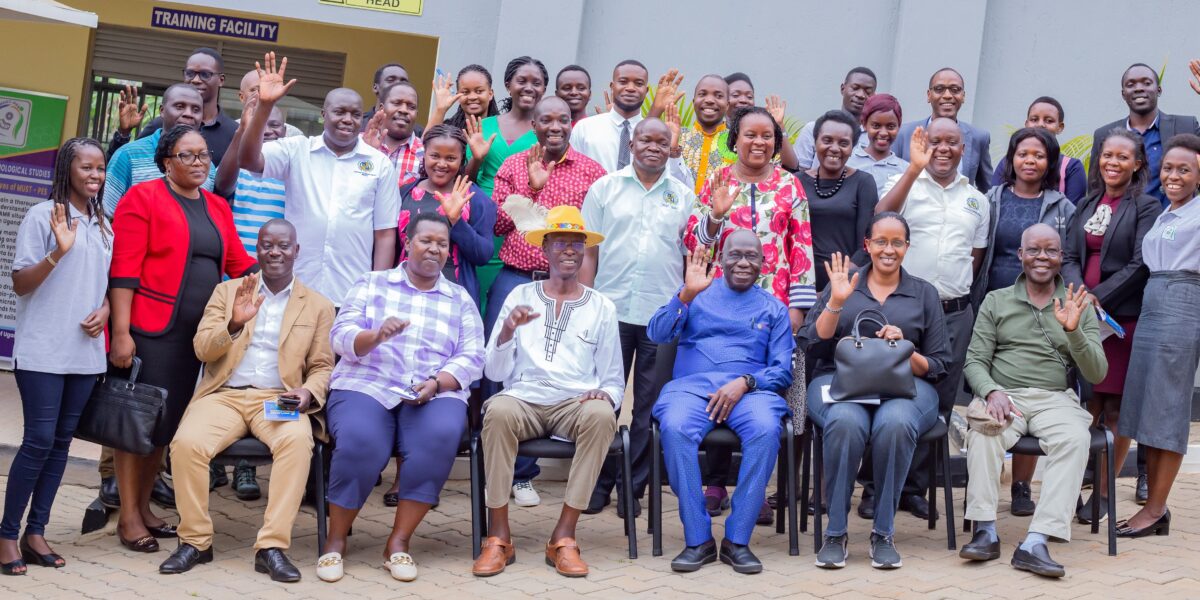October 14, 2023, the Parliamentary Committee on Science, Technology and Innovation (STI) team visited MUST to be updated about the progress, achievements, future expectations of the Government of Uganda funded project entitled- AMR Surveillance, Modeling and PCR tests Development Project ( MUSTPES).
This started with a tour guided by Assoc. Prof. Joel Bazira; the Principal Investigator of the project. He led the tour of the Genomics Translational Laboratory and Mycology Laboratory in the Department of Microbiology located in the pathology building, which has been equipped through this funding. This was followed by a project progress meeting held at the Institute of Maternal Newborn Child Health board room.

In his opening remarks; the Vice-Chancellor Prof. Celestino Obua welcomed and thanked the Parliamentary Committee on Science, Technology and Innovation for making time for MUST and appreciated their love as this was their second visit to MUST this year. He appreciated their guidance and lobbying given to support Science and Technology.
Prof. Obua further elaborated on the challenges that MUST faces in terms of infrastructure, staff recruitment and promotions. There followed a presentation by the Assoc. Prof Joel Bazira who begun by thanking the Government and Parliament of Uganda for funding Research and Innovations.
He introduced the team implementing the project including the grants office that manages the funds. He also introduced the scholars who have been sponsored by this project in the fields of Microbiology, Pharmaceutical Analysis, Medical Laboratory Sciences, Health Information Technology and Information Systems. The Co-Investigators on this project include; Prof Lubbobi Livingstone (MUK), Assoc Prof Lawrence Mugisha- (MUK), Dr. Karisa Henry – (MUK), Dr. Jacobs Iramiot – (BU), Dr. Jonans Tusimiire- (MUST), Dr Kawuma Simon- (MUST), Mr. Oloro Joseph- (MUST), Mr. Hope Derick- (MU)

Key points in the presentation by Associate. Professor. Joel Bazira
The Project aims to tackle the antimicrobial resistance challenge which is a silent epidemic slowly killing many people annually, especially in developing countries and slowly taking us back to the pre-antibiotic era; if nothing is done, more than 10 million people will be dying every year from drug-resistant infection, 80% of these will be in the developing countries like Uganda
Despite this big challenge, there is very minimal effort to discover new drugs that treat these infections world over. Literally the drug development for infectious diseases is dry. Therefore, this project was funded to design predictive models for antimicrobial resistance and prediction of which drugs (antibiotics) will still be useful by 2030, develop drugs from Ugandan plants and bacteria that live in Uganda soils and formulate a PCR kit that can diagnose drug resistant infections.
Products in production and the purpose

So far, the project has succeeded in equipping the Genomics and Mycology Laboratories in the department of Microbiology with crucial equipment like the State of the Real Time PCR machine – Quantistudio 5, Genetic Analyzer- Seqstudio, Carbondioxide incubators, -80 freezer, Gel documentation system, a shaking incubator etc
“We designed a machine AMR Predictive Model, Machine Learning Virtual Screening platforms established and designed several prototypes from Uganda plants – drugs in the making to treat Fungal skin infections, Gynae and Wound infections; including an ant-candida pessary, a vaginal gel, antifungal cream, and chewable antifungal tablet. We are also working on a wound spray and cream to treat wound infections.
To search for drugs produced by bacteria living in the soil, we have collected 77 soil samples from forest soils, mining sites, volcanic soils, sewage treatment sites, hot springs, dump sites, and slaughterhouses. We have Isolated 150 Streptomyces isolates which are undergoing screening
We are optimizing a multiplex PCR Kit for rapid diagnosis of Drug resistant infections. To further capacity building we have seven scholars pursing masters’ degrees and also involved 21 undergraduate students as interns to further their knowledge and skills in prototype formulation for 3 months and retained 3 for the final phase. These interns were student of Pharmacy, Pharmaceutical Sciences and Engineering.”

Challenges of the project
Renovation of the pathology building that lasted 5 months limiting our accessibility to continue working.
Power issues in the pathology building that include, very frequent power cuts, lack of connectivity to the University generator and Low power rating.
Some of the equipment especially in the pharmaceutical analysis laboratory are quite old and break down very frequently.
Reactions by the Parliamentary committee on science, technology and innovation

The Committee was very impressed by the progress of the project and thanked MUST and Assoc. Prof. Joel Bazira for properly utilizing the Government funds given to them and wished to see the products soon on the market. They promised to engage the Secretariat of Science and Technology -Office of the President to see if more funds can be disbursed to continue supporting this project.
We congratulate Associate Professor Joel Bazira and the team upon the achievements by far. Thank you for upholding the name of the University. We wish you the best of luck in remaining part of the project.

